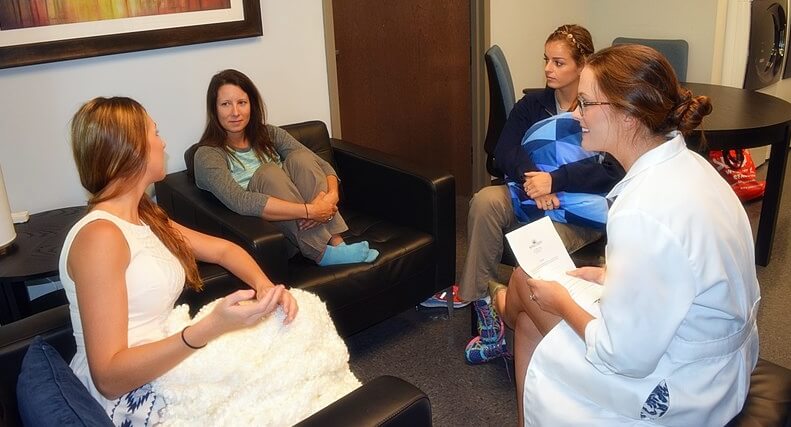Recent statistics from the Center for Disease Control and Prevention (CDC) reveal that almost half of all American adults drank alcohol regularly in the past year. Among those, nearly 18 million reported suffering from what they considered to be alcohol addiction.
There are several different risk factors that make a person more or less vulnerable to alcohol addiction. These determinants include childhood experiences or trauma (family environment and the way the child was raised), genetics, socioeconomic status, and emotional/mental health issues.
There are many external factors that can drive one to alcoholism, but it also the addictive properties of alcohol and our biological propensity for dependence that continues to propel the condition long after the need for self-medication is gone.
Symptoms of Alcohol Addiction
After a period of excessive use, a person may become dependent on alcohol. This means that their body becomes so used to operating while intoxicated that quitting is difficult due to stress and disturbing, possibly life-threatening withdrawal complications.
Overlapping dependence is tolerance, which is the need for increasing amounts of alcohol in order to achieve the desired effect. Once tolerance occurs, the person feels the need to drink larger amounts and may end up consuming much more than others without becoming drunk.
Another tell-tale sign of alcoholism is experiencing withdrawal symptoms upon waking the “day after” and possibly succumbing to the temptation to consume a “hair of the dog” (a.k.a the hair of the dog that bit you.)
Persons dependent on alcohol will eventually begin to lie to others close to them and make excuses for their drinking as a form of damage control. They may also conceal alcoholic beverages in secretive places to avoid alerting others and frequently worry over the possibility of running out.
Other signs of alcohol addiction may include:
- Needing to drink alcohol to relax
- Experiencing blackouts
- Consuming more than intended
- Exhibiting a lack of interest in activities once enjoyed
- Missing work/school time as a result of excessive drinking
- Engaging in risky behaviors such as driving drunk or drinking during pregnancy.
- Experiencing legal problems (i.e., DUI, assault)
- Experiencing family conflict and interpersonal drama due to excessive drinking
The Dangers Of Alcohol Addiction
Adverse consequences of extended alcohol abuse may result in any or all of the following:
- Increased risk of several cancers including those of the breast, throat, esophagus, and liver
- Damage to the brain, liver, pancreas, and other organs
- Birth defects such as fetal alcohol syndrome
- Increased risk of accidental death by car, injuries, overdose
- Increased risk of suicide and accidental or intentional homicide
Blackouts and Overdose (Alcohol Poisoning)
Because heavy alcohol use also impairs short-term memory, heavy drinkers in the throes of addiction often experience lapses in time during which they cannot recall what they said or did. Blackouts are incredibly dangerous and can result in personal injury, physical or sexual assault, drinking and driving, and more.
More than 2,000 people die each year in the United States from alcohol poisoning. Depending on individual factors, a .40 blood alcohol level can be life-threatening. Anyone who cannot be awakened after a bout of excessive drinking should receive medical care immediately.


Treatment for Alcohol Addiction
If you or someone you know is exhibiting signs of alcoholism, please seek treatment as soon as possible. The first step is admitting that there is a problem, and the second is actively engaging in discovery (researching and finding a compatible, reputable treatment facility.)
Treatment usually begins with a detox program. During this time – typically around 3-5 days – the patient will be supervised by medical and mental health care personnel and monitored for signs of distress. In many cases, medication can be administered to reduce withdrawal symptoms and ensure that vital signs remain stable.
After detox, most patients choose to participate in an inpatient program or an intensive outpatient program. At an inpatient, the individual will remain in a supervised facility, often for several weeks or months. These programs are beneficial because the patient is prevented from relapse while receiving care, and protected from former friends and a triggered environment conducive to drinking or using drugs.
Outpatient programs, however, allow the patient to return home and attend to their usual daily responsibilities such as work, school, relationships, children, home life, etc.
These programs encourage participation in both individual and group therapy. Individual therapy focuses on discovering the reasons why the person became an alcoholic (i.e., risk factors) and teaches him or her coping skills and how to deal with triggers and avoid relapse.
Group therapy, on the other hand, promotes socialization with others who are encountering the same problems with addiction. Many of these meetings serve mainly as “process” or support groups and allow members to talk freely and in-depth about their lives and addiction. Others are more formal and include therapy-based exercises intended to promote insight and change. Cognitive-behavioral therapy techniques are currently among the most common, effective, evidence-based practices used in both individual and group therapy.
Taking The First Steps To Sobriety
Taking the first steps to overcome your addiction can make a major change in your life from active abuse to sobriety. Though the steps you take may feel small and insignificant at first, realize that they are necessary to reach the final end goal of sobriety. Be patient with yourself and don’t rush through this process.
Choosing where to go for recovery is a critical step in sobriety. At Midwood Addiction Treatment, we give you the tools you need to beat your addiction and an experience you’ll never forget. No one can force you to be ready, but when you are, we will be here for you.
If you’re ready for that day to be today, call us now:
Most Insurance Accepted
We work with most major insurance carriers and offer a range of options to fit your lifestyle and financial means
Are You Ready to Change Your Life?
Call Us Today
A life free of drugs and alcohol is waiting for you. Our team is ready and eager to help you turn it all around. All it takes is a little willingness to make your start. Contact us today and let’s begin to write the next chapter in your life together.